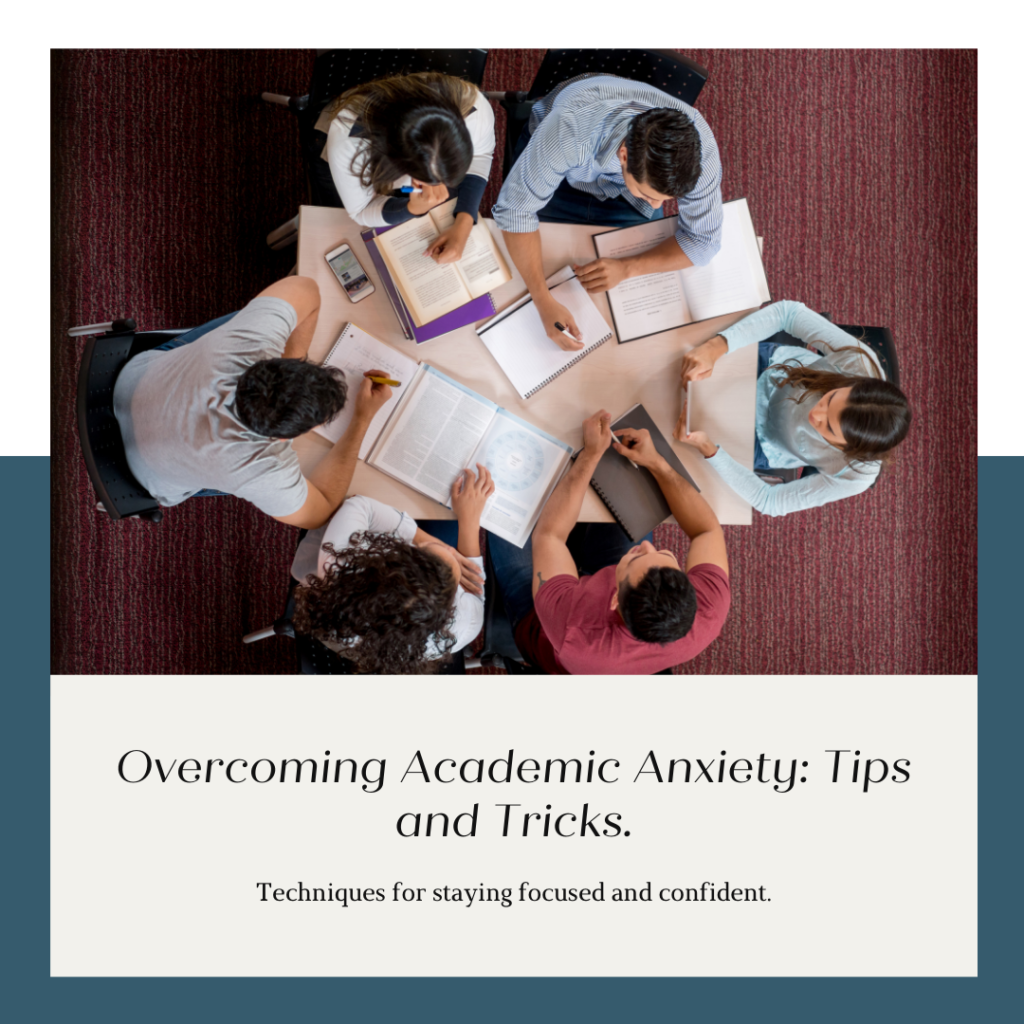Introduction
School can be an enjoyable time to make friends, find your interests and passions and much more. But for some students, it can also be a source of stress, sleepless nights, and academic performance anxiety. It’s normal to constantly think about your grades because higher test scores can possibly lead to scholarships or grants, but when you develop a feeling of fear, it can hinder your ability to achieve academic success.
In this blog, we’ll dig into the world of academic performance anxiety, why it happens, and how to overcome it. No matter if you’re a high achiever or struggling, these strategies will help you conquer your academic fears and set you on a path to success.
Chapter 1: Understanding Academic Performance Anxiety
Academic performance anxiety is very common. It’s that feeling of dread or worry when doing anything regarding academics such as exams, assignments or studying. To conquer something, you must first understand it:
1.1 What Causes Academic Performance Anxiety?
– High expectations from parents, peers, or teachers.
– Fear of Failure
– Perfectionism
– Fear of the unknown, especially in new or challenging subjects.
1.2 How Does It Affect You?
– Physically (like sweaty palms, racing heart, or stomachaches).
– Emotionally (anxiety, stress, sadness, or frustration).
– Bad performance in school.
Chapter 2: Identifying Your Triggers
The second step to conquering academic performance anxiety is finding what triggers your fear. Everyone’s triggers are different and determining them is essential for crafting a plan to overcome them. Some common triggers include:
2.1 Fear of Failure
– The worry of not meeting your own or others’ expectations.
– The belief that failure means you’re worthless.
2.2 Social Pressure
– Comparing yourself to your classmates and their success.
– The fear of judgment or teasing if you make a mistake.
2.3 Test Anxiety
– Feeling swamped or worried about your exams.
– Worrying about forgetting what you’ve studied.
2.4 Time Management
– Not knowing how to organize your workload so you are ready for a test or exam.
– Procrastination and cramming, leading to last-minute stress (I am guilty of this).
Chapter 3: Changing Your Mindset
To conquer academic performance anxiety, you must first change your mindset. A positive outlook can greatly reduce fear and help you perform better. The following strategies can be implemented:
3.1 Embrace Failure as a Learning Opportunity
– Understand that it is ok to make mistakes. It is part of the learning process.
– Learn from your errors and apply those lessons to your future endeavors.
3.2 Set Specific Measurable Achievable Realistic Timely (SMART) Goals
– Establish achievable academic goals based on your abilities.
– Break down larger goals into smaller, manageable steps.
3.3 Focus on the Present
– Instead of worrying about your future exams, focus on what you can do today.
– Take things one step at a time to avoid becoming overwhelmed.
3.4 Celebrate Small Wins
– Acknowledge all of your achievements.
– Recognize your hard work and improvements over time.
3.5 Avoid Negative Thoughts
– Replace self-defeating thoughts with positive, self-encouraging ones.
– Practice self-compassion and self-love.
Chapter 4: Effective Study Strategies
Once you’ve worked on your mindset, it’s time to focus on effective study strategies. Proper preparation is a significant confidence booster. Try some of these techniques:
4.1 Create a Study Schedule
– Organize your study time with a schedule that includes breaks.
– Stick to a routine to avoid last-minute cramming.
4.2 Effective Learning Techniques
– Engage with the material by using active recall, spaced repetition or teaching it to someone else.
– Use flashcards, mind maps, and other active learning tools.
4.3 Seek Help When Needed
– Don’t hesitate to ask for help from teachers or classmates.
– Discuss and drill down on topics you find challenging.
4.4 Stay Organized At All Times
– Use planners, to-do lists, and digital tools to manage assignments and deadlines.
– Keep your study space tidy and free from distractions.
4.5 Practice Self-Care
– Get enough sleep (I get too much of this!), eat well, and engage in physical activity (I need to do this!) to keep your mind and body in prime condition.
Chapter 5: Coping with Test Anxiety
Test anxiety is a common form of academic performance anxiety. Conquering it is crucial for better academic performance. Here are strategies to help you cope:
5.1 Preparation Is Key
– Thoroughly study and review the material.
– Practice with mock exams to become familiar with the format.
5.2 Breathing and Relaxation Techniques
– Deep breathing exercises can calm your nerves.
– Progressive muscle relaxation can reduce physical tension.
5.3 Visualize Success
– Close your eyes and imagine yourself calmly and confidently taking the test.
– Visualizing success can boost your self-confidence.
5.4 Stay Positive
– Challenge negative thoughts during the test.
– Focus on the question at hand and avoid thinking about previous questions.
5.5 Stay Hydrated and Energized
– Bring water and a healthy snack to the test to maintain focus and energy.
Conclusion
Don’t be afraid to seek support from your teachers or parents. Remember that you’re not alone in your academic journey, and it’s okay to seek help when needed. Take breaks when you feel overwhelmed.
Academic performance anxiety can be a challenging hurdle, but with the right mindset and strategies, you can conquer it. By understanding your triggers, shifting your mindset, adopting effective study habits, and coping with test anxiety, you’ll be well on your way to academic success and a more enjoyable high school experience. So, take a deep breath, believe in yourself, and let’s tackle those academic fears together!

